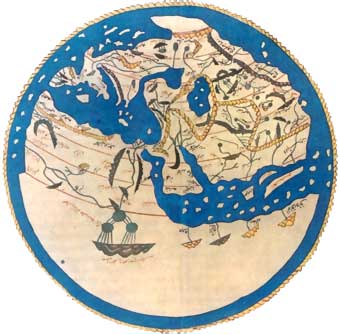It was written in Greek, not Aramaic (and it is not quoting Jesus). If you are suggesting it was changed in the light of ideas introduced in the Qur'an you really do need to put up some evidence... there is no indication that any changes of that sort have ever occured in the NT. It is far more likely the exchange was the other way around.. or, for the theists, I suppose, from the same source several hundred years apart!
amazing isn't it? considering that Aramaic was the language of jesus? I have no interest in putting up where they got their info from or how it evolved along the way.. it doesn't affect the Quran one way or the other..
The civilization excelled in science compared with it's contemporaries, certainly. So did that of the Greeks a thousand years previously. What evidence links that to the contents of the Qur'an rather than the prevailing social and intellectual environment?
here are some suggested reads as to how Islam picked up where Greeks failed a thousand year prior.
and how Islam influenced science rather than a prevailing movement--
You also really ought to study arabia a bit before the advent of Islam and what became of it afterwards..
The first Muslim physician is believed to have been Muhammad himself, as a significant number of hadiths concerning medicine are attributed to him. Several Sahaba are said to have been successfully treated of certain diseases by following the medical advice of Muhammad. The three methods of healing known to have been mentioned by him were honey, cupping, and cauterization, though he was generally opposed to the use of cauterization unless it "suits the ailment." According to Ibn Hajar al-Asqalani, Muhammad disliked this method due to it causing "pain and menace to a patient" since there was no anasthesia in his time.[2] Muhammad also appears to have been the first to suggest the contagious nature of leprosy, mange and sexually transmitted disease;[3] and that there is always a cause and a cure for every disease,[2] according to several hadiths in the Sahih al-Bukhari, Sunan Abi Dawood and Al-Muwatta attributed to Muhammad, :
another link
http://links.jstor.org/sici?sici=00....0.CO;2-E&size=LARGE&origin=JSTOR-enlargePage
M. H. Hart, "The 100: A Ranking of the Most Influential Persons in History." Hart Publishing Co., New York, 1978.
S. H. Nasr, "Science and Civilization in Islam." New American Library, Inc. New York, 1968, pp.184-229.
A. Salam, IAEA Bulletin, 22(2): 81-83, 1980.
D. Campbell, "Arabian Medicine," Cambridge University Press, 1921, pp. 56-57.
5. P. Hitti, "The Arabs: A Short History", Henry Regnery, Chicago, 1943, p. 143.
A. Castiglioni , "A History of Medicine", E. Krumhbhaar (trans), Alfred A. Knopf, New York, 1958, p.268.
M. Siddiqui, "Studies in Arabic and Persian Medical Literature", Calcutta University, Calcutta, 1959, p. XX.
T. E. Keys, K. G. Wakim, Mayo Clinic Proceedings of the Staff Meeting, 28: 423-437, 1953.
E. Abouleish, J. Islamic Med. Assoc. (JIMA) 10(3,4): 28-45, 1979.
L. Burton, " 1001 Nights (Six Volumes)", 1884.
C. Singer and A. A. Underwood, "A Short History of Medicine", 2nd edition, Oxford University Press, New York, 1962, p. 76.
B. Miller, Mankind, 6(8): 8-40, 1980.
A. A. Khairallah, Ann. Med. Hist. 34: 409-415, 1942.
Al-Okabi, Hospital Med. Prac., Cairo, 1: 14-29, 1971.
F. S. Haddad, "XXI Int. Cong. Hist. Med.", (Vienna 1968, Sep. 22), 1970, pp.1600-1607.
F.S. Haddad, Leb. Med. J. 26: 331-346, 1973.
C. Elgood, " A Medical History of Persia", Cambridge University Press, Cambridge, 1951, pp. 278-301.
F. H. Garrison, "History of Medicine", 4th Edition, W. B. Saunders Co., Philadelphia, 1929. P.134.
peace!




